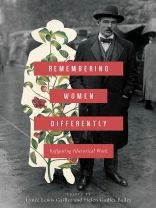An examination of women’s work, rhetorical agency, and the construction of female reputation
Before the full and honest tale of humanity can be told, it will be necessary to uncover the hidden roles of women in it and recover their voices from the forces that have diminished their contributions or even at times deliberately eclipsed them. The past half-century has seen women rise to claim their equal portion of recognition, and Remembering Women Differently addresses not only some of those neglected—it examines why they were deliberately erased from history.
The contributors in this collection study the contributions of fourteen nearly forgotten women from around the globe working in fields that range from art to philosophy, from teaching to social welfare, from science to the military, and how and why those individuals became either marginalized or discounted in a mostly patriarchal world. These sterling contributors, scholars from a variety of disciplines—rhetoricians, historians, compositionists, and literary critics—employ feminist research methods in examining women’s work, rhetorical agency, and the construction of female reputation. By recovering these voices and remembering the women whose contributions have made our civilization better and more whole, this work seeks to ensure that women’s voices are never silenced again.
Inhoudsopgave
Introduction: Re-Collection as Feminist Rhetorical Practice, by Letizia Guglielmo
Social Network as a Powerful Force for Change: Women in the History of Medicine and Computing, by Gesa E. Kirsch and Patricia Fancher
From Erasure to Restoration: Rosalind Franklin and the Discovery of the DNA Structure, by Alice Johnston Myatt
Taming Cerberus: Against Racism, Sexism, and Oppression in Colonial and Postcolonial Nigeria, by Maria Martin
Afterlives of Anna Komnene: Moments in the History of the History of Byzantium, by Ellen Quandahl
Not Simply ‘Freeing the Men to Fight’: Rewriting the Reductive History of U.S. Military Women’s Achievements on and off the Battlefield, by Mariana Grohowski and Alexis Hart
The Audubon-Martin Collaboration: An Exploration of Rhetorical Foreground and Background, by Henrietta Nickels Shirk
‘Please cherish my own ideals and dreams about the School of Expression’: The Erasure of Anna Baright Curry, by Suzanne Bordelon
Remembering Women: Florence Smalley Babbitt and the Victorian Family Photograph Album, by Kristie S. Fleckenstein
‘I have always been significant to myself’: Alice James’s Pragmatic Activism, by Hephzibah Roskelly and Kate Ronald
Defying Stereotypes: An Indian Woman Freedom Fighter, by Gail M. Presbey
The Rhetorical Reputation of Forgotten Feminist Lois Waisbrooker, by Wendy Hayden
Not So Easily Dismissed: The Intellectual Influences and Rhetorical Voice of Dorothy Day—’Servant of God’, by Laurie A. Britt-Smith
Activist, Pacifist, Mother, Feminist, Wife: Private Interventions and the Public Memory of Crystal Eastman, by Amy Aronson
Turning Trends: Lockwood’s and Emerson’s Rhetoric Textbooks at the American Fin de Siecle, by Nancy Myers
Afterword, by Lynée Lewis Gaillet
Over de auteur
Lynée Lewis Gaillet is Distinguished University Professor and chair of the English Department at Georgia State University. She received a National Endowment for the Humanities Research Award and an International Society for the History of Rhetoric Fellowship. Gaillet is the author of many articles and book essays on rhetoric, program administration, composition/rhetoric pedagogy, and archival research methods.












